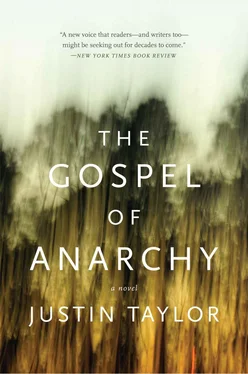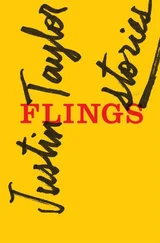From the back room at Clasen’s, he called all the people with her last name in the St. Johns County phone book and eventually reached her father, who sounded none too pleased to provide him with his ex-wife’s phone number — but he did, and Thomas finally got hold of her, and she told him what she knew about what happened. It was five days till Christmas. What could she do? She invited him to her mother’s, which was a whole fiasco in itself, the upshot of which was that she cut her visit short and the two of them spent NYE2K blowing the kindly train couple’s money (and some of Anchor’s father’s) on a twenty-five-dollar-a-night road motel in Waldo, for all intents and purposes off the map, if not the grid.
After the world didn’t end, Anchor said it was stupid of her to have left it like that with her mother, and she wanted to go back to Ponte Vedra and patch things up. Thomas, who wasn’t exactly not invited, but whose presence certainly wouldn’t make things easier, said he thought he’d go back to Gainesville and check on Liz, who was living with her mother again. Not long after school was back in session, he started crashing with Anchor at her dorm, which was okay until her roommate’s boyfriend dumped her, because then Sheila started to pick up on how Thomas hung around even when Anchor was at class. Not wanting to seem uncool, Sheila held her peace for as long as she could stand to, and by the time she finally confronted her roommate, Anchor was actually relieved, even grateful, because her reunion with Thomas was way past its sell-by date, and the only thing keeping them together was inertia plus the fact that he had nowhere to go. Now he would have to figure something out, a new plan. Fuck it, he said, he was the king of new plans. She encouraged him to go see his family, and/or David’s. He said he’d see where the wind blew him — some dumb shit like that.
But then he never went anywhere. He got his old job at Clasen’s back, and a room opened up at the Palace of Zinn. They run into each other sometimes, and either say hello or don’t.
In August she cut her dreadlocks off and dyed her buzz cut red.
Around that same time she started volunteering two afternoons a week at Bread and Roses, a local not-for-profit women’s health center. She helps out with paperwork and takes phone calls. Anti-choice fanatics crowd the sidewalk out front, holding up posters of mangled fetuses and shrieking like campus evangelists, which, she assumes, some of them also are. The women come in stone-faced and spooked, lower lips quivering, or else cursing blue streaks. Anchor talks to them, sometimes about what they’re going through but usually not; usually it’s just, “Hey, how are you” and whatever. Mundane chatter calms them down.
It feels good to be part of something. To know you are doing right, not for the whole world, maybe, not all at once, but for this woman, for that one, for yourself. It was hard at first to balance the volunteering with her classes, but she’s gotten the hang of things, made it over the hump of midterms, and is pretty much cruising along.
It is November, another November. Today is election day.
It’s dark in her dorm room, but bright outside. A sun-line limns the borders of the heavy shade. Anchor’s first class is at 11:05, which is in an hour and a half. After class she’s going straight to the clinic, so if she’s going to vote, she should really go do it first thing. There’s a polling place right in Turlington Hall.
Despite all their personal drama, Thomas is still basically her model of an Authentic Anarchist, and he would say — indeed, has said — that voting is more than merely a waste of time, it’s irresponsible , which is the worst thing an anarchist can be. By engaging with the system on its terms, by believing the lie, you help legitimize and perpetuate something fundamentally illegitimate. He says. And, who knows, on some level it might even be true. On the other hand — and this, for her, is the kicker — it’s the first election she’s ever been eligible to vote in, and it’s one of those things you grow up imagining yourself doing, and now she wants to do it. That might not be the greatest, most ethically sound reason, but it’s hers.
She wants to see if the booth will actually look like she imagines.
It doesn’t.
She always thought of it as a quiet space, sealed off, maybe like an old-timey phone booth, but this thing is a gray plastic table — like from a Fisher-Price set — standing on spindly metal legs in the bustling ground-floor lobby of Turlington Hall. The privacy curtain is blue and looks like it should be dividing first class from coach. It doesn’t even hang as low as her waist. But she’s in there, pen in hand, looking over the list of mostly strange names. All politics is local — they’re always saying that at the clinic — but here she is not knowing who most of these people are or what they stand for. As a kid she never thought about all the minor stuff, ballot measures and constitutional amendments and whatnot. What does a comptroller even do ? She always imagined the ballot as a single question written in direct address. ANCHOR, WHO DO YOU WANT THE PRESIDENT TO BE? So okay, forget the whole rest of it. This one at least is a no-brainer; she may be wrong to be here at all but she can at least mitigate the damage by voting her conscience. And anyway she isn’t sure that Thomas is right about this. Refusal too is action; there is no way to be in the world without being part of it.
She remembers how David and Katy didn’t want a website. What would they say if they could know that there are five sites now? Anchor doesn’t involve herself, doesn’t post on their boards or check regularly for updates, but she knows what’s out there, more or less. Splinter sects have emerged, with conflicting creeds and tenets, mostly centering on the one question Parker seems never to have considered: that of who the “real” prophet is, or was, and how to choose one over the rest, or else the whole holy rabble en masse. Some see Parker as Christ’s agent, therefore underling; others say Parker was (or is, since he’s still MIA) Christ’s successor, therefore supplanter; and others still identify David as the true and chosen exponent of the gospel of anarchy, all the more pure for having left behind no book and no body, nothing but rumors and ash.
A thought passes through her mind— Desire is a strange attractor. Your longing warps the arc of the world’s emergent truth— as she darkens the bubble for Nader, slips the ballot into the slot, exits the booth, and walks off to have her day. She does all the things that she planned to do, then heads from Bread and Roses to Leonardo’s, the hipster pizza place that they always used to dumpster from. She’s meeting this guy there. After dinner, they decide to take a little walk, and end up at this record store where she picks up the new Radiohead album, which she heard playing at a coffee shop a few days ago, and even though she doesn’t usually go in for electronica, there’s something… different about this. She can’t say what exactly, but there’ll be plenty of time to figure it out, because she owns it now. It’s in her purse. Since they’re basically next door to the Shamrock already, they decide to have a couple of drinks, and then it’s getting kind of late, so.
“You feel like walking me home?” she asks him.
“Yeah, that sounds good.”
And why shouldn’t it? Good is this guy’s whole thing. He’s funny, attentive, sweet to her, etc. So what if he pledged a frat freshman year? He’s not in it anymore. They share a kiss good night — not just a quick peck, either; a good one — but she doesn’t invite him up. She has before, and she will again, but not tonight. Tonight she sleeps alone, and happens to dream a particular dream, the only recurring dream she’s ever had. It has come with irregular and (mercifully) diminishing frequency over the past year. She expects it will come less and less often the more time goes by, but she knows in her heart that it will never entirely go away.
Читать дальше












